Departments and faculties
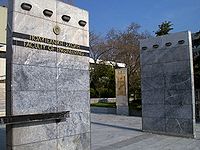
The gate of the university's Faculty of Engineering.
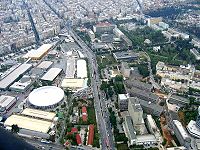
Aerial view of Central Thessaloniki.On the right the Aristotle University's campus.
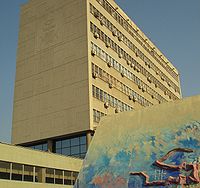
The Polytechnic Faculty of the Aristotle University of Thessaloniki
.
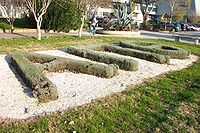
APTH letters in Greek (ΑΠΘ)
.
The university includes 12 Faculties, consisting of 36 Schools :
- Faculty of Agriculture
- Faculty of Dentistry
- Faculty of Education
- School of Early Childhood Education
- School of Primary Education
- Faculty of Engineering
- School of Architecture
- School of Chemical Engineering
- School of Civil Engineering
- School of Electrical and Computer Engineering
- School of Mechanical Engineering
- School of Mathematics, Physics and Computational Sciences
- School of Rural and Surveying Engineering
- School of Spatial Planning and Development Engineering
- Faculty of Fine Arts
- School of Drama
- School of Film Studies
- School of Music Studies
- School of Visual and Applied Arts
- Faculty of Forestry and the Natural Environment
- Faculty of Law, Economics and Political Sciences
- School of Economics
- School of Law
- School of Political Sciences
- Faculty of Medicine
- Faculty of Sciences
- School of Biology
- School of Chemistry
- School of Geology
- School of Informatics
- School of Mathematics
- School of Physics
- Faculty of Philosophy
- School of English Language and Literature
- School of French Language and Literature
- School of German Language and Literature
- School of History and Archaeology
- School of Italian Language and Literature
- School of Philology
- School of Philosophy and Pedagogy
- School of Psychology
- Faculty of Theology
- School of Ecclesiastical and Social Theology
- School of Theology
- Faculty of Veterinary Medicine
- Independent Schools
- School of Journalism and Mass Media Studies
- School of Pharmacy
- School of Physical Education and Sports Sciences
Notes:
1) The Faculty of Engineering is also known as the Polytechnic Faculty.
2) The School of Urban-Regional Planning and Development Engineering is located in Veroia.
3) The Faculty of Medicine is strongly associated with the AHEPA University Hospital.
4) Philosophy is typically taught in conjunction with Pedagogy on Greek Universities, unlike foreign counterparts[1]
5) Part of the School of Physical Education and Sports Sciences is located in Serres.
历史
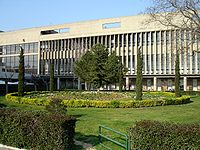
The garden outside the faculty of Law, Economic and Political Sciences, where there is also a solar clock.
The Aristotle University of Thessaloniki was founded in 1925 during the premiership of Alexandros Papanastassiou. It was the second Greek university at that time, following the University of Athens, and its establishment was legislated under Law 3341/14-6-25.
According to Eleftherios Venizelos' plans right after the end of the First World War, Smyrni was intended to be the seat of the second Greek university, while the third university was to be established in Thessaloniki. However, Smyrni was not part of Greece at that time and these plans fell through after the outcome of the Greco - Turkish War in Asia Minor. Nevertheless, in 1924 Alexandros Papanastassiou decided to found a university in Northern Greece in order to boost the local economy and culture .
The chronological development of the University, which was renamed the Aristotle University of Thessaloniki in 1954, can be divided into three stages, each covering a period of approximately twenty-five years.
During the first stage of its operation (1926-1950), the development focused on those Schools which were generally accepted as constituting one educational Institute, namely the Faculty of Philosophy, the Faculty of Physics and Mathematics, the Faculty of Law and Economics, the School of Theology and the Medical School. The first stage of development ended with the foundation of the Faculty of Veterinary Medicine in 1950, which was the only faculty of Veterinary Medicine in Greece for many years. After this period, some of the aforementioned faculties were extended by integrating more departments. In more detail, the Departments of Pharmacy and Dentistry were founded in 1955 and 1959 respectively and they were incorporated into the Medical School. Moreover, the Faculty of Philosophy was expanded by integrating the Institutes of Foreign Languages (English, French, German and Italian).
During the second stage (1951-1975) the focal point of development was the Faculty of Engineering, also known as the Polytechnic Faculty. At the beginning, this faculty constituted an independent institute also called the Polytechnic or Technical University . Therefore, for the first fifty years of its operation the Aristotle University consisted of two distinct institutes which operated independently. Subsequently these two educational institutes where unified. The various Schools within the Faculty of Engineering were founded in the following order: School of Civil Engineering (1955-56), School of Architecture (1956-57), School of Rural and Surveying Engineering (1962-63), School of Mechanical and Electrical Engineering (1972-73), School of Chemical Engineering (1972-73), School of Mathematics, Physics and Computational Sciences (1982-83) and School of Urban-Regional Planning and Development Engineering (2004). The School of Mechanical and Electrical Engineering was split in two independent schools (School of Mechanical Engineering and School of Electrical and Computer Engineering) in 1976.
Finally, during the third stage of its development (1975-today), new Schools and Departments were founded along with the aforementioned Engineering Schools. Moreover, the university acquired a small number of departments which operated in the past as independent institutes of Higher Education. During this period, the Faculty of Fine Arts was established, along with all its constituent Schools (Drama, Film Studies, Music Studies, Visual and Applied Arts). Additionally, the School of Journalism and Mass Media Studies and the School of Physical Education and Sports Sciences were created as independent schools. Overall, the third stage of development of the Aristotle University is characterized not only by the establishment of new Faculties, Schools and Departments, but also by many major changes in the structure of the university itself. These changes include the downgrade of some former Faculties into Schools or Departments and the upgrade of others.
Today, the Aristotle University comprises 12 Faculties, 36 Schools and numerous other units (laboratories, study rooms, libraries, clinics, research centres etc.), which make it the largest university in Greece and southeastern Europe in terms of number of staff, undergraduate and postgraduate students and the facilities offered .
Organization and administration
The Aristotle University is one of Greece's public Universities and therefore it is a legal entity with full self governance. It is primarily state-funded and functions under the supervision of the Greek Ministry of National Education and Religious Affairs. Other financial resources for the university are donations from individuals, participation in various EU research programmes and profits generated through management of the university assets. It is important to note that no fees are charged to the students of the university.
The administration of the university consists of collective bodies who take decisions within the framework of the Greek laws. Main objective of the administration's efforts is to ensure the proper function of the university and pursuit the benefit of the academic community as a whole.
Hierarchy
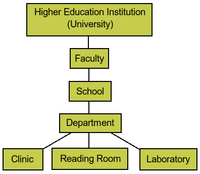
The hierarchy every Greek University follows.
In Greece every University (Higher Education Institution) implements the hierarchy shown in the image.
Every Greek public University comprises the faculties and the faculties comprise the schools. A school covers a basic scientific area and thus is considered to be the basic academic unit. Every school is subdivided into departments, which are responsible for the teaching of a specific part of the school's scientific area. Moreover, departments have substantial autonomy in educational matters and therefore they are mainly responsible for planning and implementing educational programs and granting degrees. Finally, clinics, reading rooms and laboratories are smaller units that belong to a department.
Administrative authorities
University Senate
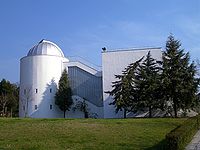
The Star Observatory of the Aristotle University of Thessaloniki located inside the University campus.
The highest administrative authority is the University Senate. It consists of the following members (senators):
- The Rector and the three Vice-rectors.
- The Deans of the various Faculties.
- The Chairmen of the various Schools.
- Representatives of the associate professors, assistant professors and lecturers.
- Representatives of the Special Laboratory Teaching Staff and the Administrative Staff.
- Representatives of the undergraduate and postgraduate students of every Faculty.
Rector's Council
The second highest administrative authority is the Rector's Council, which comprises the Rector, the tree Vice-rectors, one student representative and one representative of the administration staff. Each member of the Rector's Council is elected every 3 years.
Rector
The Rector is the president of the University Senate and the main representative of the University in various national and international bodies. Moreover, he/she is responsible for developing an overall strategy for the development of the university and for implementing the decisions taken by the Senate and the Rector's Council. Both the Rector and the three Vice-rectors are elected every three years in university-wide elections where all faculty, staff and student representatives vote. Each Vice-rector has different administrative responsibilities, among which are: staff management, financial planning and development, academic affairs.
Faculty, School and Department administrative bodies
Every faculty, school and department has its own administrative body, the members of which are democratically elected on the basis of collective processes . In more detail, decisions on academic, financial and administrative matters within a single department are made by the department's General Assembly, which consists of faculty members and student representatives. The decision making process often involves the creation of ad hoc committees.
Staff
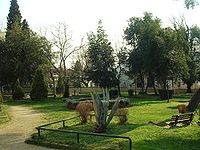
A picture of the Aristotle University's campus. Here the garden beside the Philosophical Department building is shown.
The university staff is divided into five main categories:
- Teaching and Research Staff: The staff in this category undertakes the majority of the teaching and research work done in the university. It comprises professors, associate professors, assistant professors and lecturers. These four levels were established under law 1268/1982 and in order to advance to a higher level, one must show significant teaching and research work.
- Scientific Teaching Staff: This category consists of former teaching and research assistants. Their main role is to cooperate with the Teaching and Research staff and assist them in their teaching responsibilities.
- Special Laboratory Teaching Staff: The members of this category are administering the university laboratories and they undertake special applied and laboratory teaching work.
- Special Technical Laboratory Staff: They are responsible of keeping the laboratory equipment in good condition and upgrade it whenever necessary in order to stay up to date. They also provide specific technical laboratory services and help with the laboratory teaching.
- Administrative Staff: This category comprises all employees working in administrative positions.
The educational work is also exercised by people that do not belong to the university staff, such as guest professors and generally scientists who are invited to teach specific courses.
University units
The campus of the Aristotle University covers 230,000 square metres and is located near the centre of the city of Thessaloniki. The majority of the university units is found inside the campus, but there are also various institutions, laboratories and facilities of the university which are located outside the campus (Centre of Byzantine Researches, Veterinary clinics, University farm and forest reserves etc.) . The following are some of the most important university units of the Aristotle University:
Library
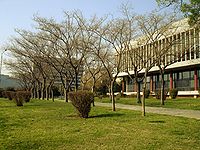
The Main Library located at the centre of the campus.
The Aristotle University Library was founded in 1927 and is constituted of two main elements: The Central Library, which is housed in a separate building at the centre of the university campus and the departmental libraries, every one of which is owned by a university department. These two elements comprise the A.U.Th. library system, where more than 800,000 book titles and 300,000 volumes of periodicals can be found. The A.U.Th. library subscribes also to 3,500 periodical titles from all over the world.
The Central Library has a reading room for students and a reading room for university researchers and teaching personnel. The students' reading room has a capacity of approximately 1300 students and can be used by any student who brings and reads his own books.
Every department of the university has its own departmental library, where students can find books, periodicals and information concerning the specific subjects their department deals with. Every departmental library has a reading room whose opening hours are determined according to the needs of the department's students and staff.
The Aristotle University Library is nowadays the second greatest library in Greece, right after the National Library, and the largest library in Northern Greece. Since 1976 the Library has been a member of IFLA (International Federation of Library Associations) which enables it to lend and borrow books from libraries all over the world.
Student Club
The University Student Club is housed in a private building located on the eastern side of the campus and plays a very important role in student life. Inside the Student Club is a restaurant, a reading room, a medical service, a snack bar and a hairdresser's shop. There is also a musical department and a photography club .
The Student Club is responsible for the catering and medical care of the students of A.U.Th. and University of Macedonia. Every day it caters for approximately 12.000 students. Among its other responsibilities, it also organizes artistic, cultural and athletic events and maintains a chorus and a musical department .
Sports centre
The University gym is located on the eastern side of the university campus, next to the Student Club. It covers an area of 220,000 square metres and was initially founded in 1925, the same year as the University. Since then it has been transferred several times until 1978 when it was finally settled at its present position.
Inside the university Sports Centre there is a football field, basketball and tennis courts, handball courts and many more facilities for dancing, weight lifting, ping pong and so on. The National and Poseidonion swimming pools are used for water sports such as swimming, water polo, water aerobics and synchronized swimming .
The students participating in the sports programs of the centre can take part in the internal championships organized by the Sports Centre or in the inter-university national championships organized by the Sports Committee of the Higher Education in Greece. The A.U.Th. has always participated in these national championships with great success .
Residence halls
Aristotle University of Thessaloniki owns three residence halls for AUTH students with a capacity of 1740 students; they are administered by the National Youth Foundation. They include reading rooms, sport facilities, restaurants, café etc. One, "40 Ekklisies", is near the campus; the other two are far from the campus, in "Kalamaria" and "Bardaris" .
The residence halls are reserved for students with special needs, such as members of low-income or large families, as well as some foreign students.
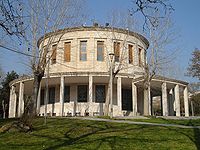
The weather observatory of the Aristotle University of Thessaloniki.
Seismological Station
The Aristotle University Seismological Station was founded in 1978 and is used since then for the detection and measurement of earthquakes that occur nationwide and worldwide. It is mainly used by researchers of the Sector of Geophysics, which is a part of the Department of Geology of A.U.Th.
The Station's main objective is to monitor Greece's seismic activity, record and analyze the earthquakes that occur in 24-hour base, informing the state and the public when it is necessary. This is a very important task given the fact that Greece is a country with a very powerful seismic activity. The personnel of the station is constituted of professors and specialized scientists with a great deal of experience concerning seismological matters.
One of the Station's primary roles is to conduct tours for the public and familiarize it with the earthquake phenomenon and how it can be dealt with. This helps to achieve better protection of the public against earthquakes.
Finally, the Seismological station promotes collaboration on issues of seismological interest with a lot of other Greek and European institutions. It is also a source of information for international seismological centres concerning the seismic activity of the Mediterranean region, but also of the entire world .
Farm and Forest Reserves
The University Farm covers an area of 1.9 square kilometres and is located in the east side of Thessaloniki near the city airport. It was ceded to the Aristotle University by the Greek Ministry of Agriculture in order to cover the research and educational needs of the School of Agriculture.
Inside the farm there are 21 buildings, two of which are used throughout the whole year as convention centres where conferences, events, presentations and lectures take place. The rest 19 buildings house laboratories of the School of Agriculture, where research and educational activities take place. Furthermore, the farm is used by staff and students of the School of Agriculture in order to grow experimental crops, breed animals and conduct laboratory excises.
The farm is managed by a Board of Directors, which consists of 3 professors, 1 laboratory director and 1 representative of the people working at the farm. It is elected every 2 years and its president is the president of the School of Agriculture .
The University Forest Reserves cover a total area of 88 square kilometres. The first one is located in Pindos mountain at an altitude of 1,100 to 1,200 metres and covers approximately 33 square kilometres. The second one is located in Chalkidiki at an altitude of 300 to 1,200 metres and covers approximately 55 square kilometres. Both of these university forests are used by the Faculty of Forestry and Natural Environment in order to conduct research and student training. Inside the forests there are special buildings where staff and students can stay overnight .
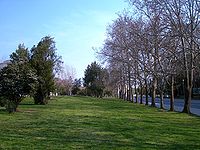
An image of the university's campus
Camping Facilities
The University Camp was initially founded in 1960. It is now is located in Poseidi, Chalkidiki, in a very beautiful place by the sea, full of pine trees. It opens its gates every year during the summer period for the students and the staff of the A.U.Th. The camp consists of a restaurant, a small grocery store, a bar in the beach, basketball and beach volley courts and many more sport and entertainment facilities .
School of Modern Greek Language
The School of Modern Greek Language [2] functions under the supervision of the Department of Philosophy since 1970. It offers courses of Modern Greek Language and Greek Culture to foreign students who wish to learn the Greek language and/or intend to study in a Greek University. The main objective of the School is to familiarize its students with the Greek culture, tradition and customs .
Institute of Modern Greek Studies
The Institute of Modern Greek Studies was established in 1959 with the support of Manolis Triantafilidis' bursary. The institute is housed in the building of the Faculty of Philosophy and is practically a branch of it. Its main mission is the advance of science and the promotion of Greek education and philology. This mission is accomplished mainly through the publication of books concerning Greek language, philology and literature. A Board of Directors comprising seven members manages the Institute. Six of them are professors from the Faculty of Philosophy and one from the Faculty of Law .
Centre for Byzantine Research
The Centre for Byzantine Research [3] was established in 1966 by a group of professors of AUTH. Its main aim is to study Byzantine history, law, art and culture, as well as the training of graduates and specialized researchers in Byzantine studies. The Centre coordinates a variety of research programs and collaborates with many other foreign and domestic institutions. Furthermore, it frequently organizes scientific meetings and conferences and it also publishes a special periodical called "ΒΥΖΑΝΤΙΝΑ". The Centre for Byzantine Research is managed by a five-member administrative council .
Student services
Career Services Office
The Career Services Office of the Aristotle University of Thessaloniki was established in 1997 and its main objective is to help students and graduates take decisions concerning their future studies and career. It provides support and information about a variety of subjects including: undergraduate and postgraduate studies in Greek or foreign universities, available scholarships, student mobility programs (IAESTE, SOCRATES etc.), labor market in Greece and abroad, job vacancies and many more. There is also a group of specially trained personnel, which provides advice and guidance to students and graduates on decision making, CV compilation, job interviews and job application .
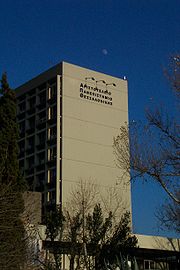
The AUTH Administration building.
The Career Services Office organizes regularly career seminars inviting professionals from different scientific fields to lecture about their jobs and the status of the job market. These career seminars appear to be very helpful because they give students and graduates a chance to get in contact with people of different professions and acquire information about their experiences and accomplishments.
Network Operations Centre
The Network Operations Centre is responsible for managing the data network of the Aristotle University of Thessaloniki. It was established in 1995 under the supervision of the Data Network Committee of the university. NOC's main objective is to provide quality network services to the academic community of the Aristotle University of Thessaloniki. Among many services, NOC also provides the following:
- Internet connectivity to all AUTH members (students and staff)
- Basic network services (email, web hosting, Digital Certificates, Dial up)
- Advanced network services (VoIP, Video Conference, Wireless networking, VPN, Proxy)
- Technical assistance
NOC's staff consists mainly of network specialists, undergraduate students working part-time as network technicians and undergraduate students as trainees. It is mainly funded by the Greek state and the European Union, as it participates in a variety of European Union programs .
Information Technology Centre
The Information Technology Centre of the Aristotle University of Thessaloniki was established in the beginning of 1998 under the financial support of the Greek Ministry of Education and the European Union. Its mission is to provide the academic community of the university with a variety of computer facilities, such as client–server applications, host-based applications, High Performance Computing and many more. It also provides technical support via email, phone or fax to all AUTH members and takes care of central backup issues, site licensing matters, maintenance contracts, etc. ITC regularly organizes seminars on topics of computer science, popular software packages and the usage of the university infrastructure. Some of the services provided by ITC to AUTH members are listed below :
- Technical support and consultation services on IT issues
- Educational seminars
- Distribution of public domain software
- Maintenance and support of AUTH Computer Labs
- Central multi-platform backups
Students of the university who have special knowledge and experience on IT can apply to ITC and work part time (3 hours daily). Currently ITC employs 8 undergraduate students .
Student social support
The students of AUTH are supported by two independent institutions: The Social Policy Committee and the Student Counseling and Guidance Service.
The Social Policy Committee aims at solving a variety of problems the students may face and thus improve academic life on campus. It was established by the University Rector's Council in September 1997 and since then it has offered its services to a great number of students. These services are briefly listed below :
- Supports students with special needs
- Provides information concerning health care issues
- Offers counseling and psychological support
- Organizes numerous activities and events related to its objectives.
The Student Counseling and Guidance Service provides mainly psychological support and counseling to students on a variety of issues including social and academic life, family problems, adjustment difficulties, emotional problems etc. It also organizes seminars and on a regular basis that deal with stress handling, exam preparation, study time organization and many more. With the help of the Student Counseling and Guidance Service students can more easily adapt to student life and surpass any problems or difficulties. All these services are provided to students free of charge .
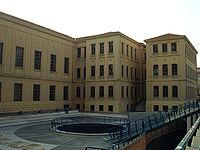
The rear of the Philosophical Department's building.
Health care services
All students of Aristotle University of Thessaloniki (Greek or foreign, undergraduate or postgraduate) are provided with health insurance which covers free medical care. This means that hospitalization and medication are provided free of charge. The insurance is valid for the entire period of studies, as long as it doesn't last more than one and a half times its normal duration. Every student who wants to receive free medical care must possess his personal health insurance booklet which is issued and renewed every year by the secretary of the department he/she studies in. Among others, health insurance provides: medical examination, dental examination, physiotherapy, etc. .
Student unions
Every department of the university has a corresponding Student Union and all students belonging to the department have the right to register as members. The main objective of a student union is to solve students' problems that can either be related to academic life or have a general political and social nature. Furthermore, Student Unions organize and support numerous activities such as political debates, educational lectures, cultural and artistic events, conferences, demonstrations, university occupacions and so on.
The structure of a Student Union is rather simple and comprises two bodies: The General Assembly and the Board of Directors. The General Assembly consists of all student-members of the Union. It takes place on a regular basis and is the only decision-making body. During the General Assembly, many topics of student interest are discussed and the decisions are taken after open vote. The Board of Directors makes sure that the decisions of the General Assembly will be materialized. Moreover, the members of the Board of Directors, among which is the Union's President, participate in various university administrative bodies as representatives of all students in the Union.
Every year in early spring the Student Elections take place nationwide, during which students vote for their representatives.
All Student Unions in Greece are members of the "National Student Union of Greece" (ΕΦΕΕ - Εθνική Φοιτητική Ένωση Ελλάδας). Moreover all Student Unions of the Aristotle University of Thessaloniki form the "Aristotle University of Thessaloniki Student Union" (ΦΕΑΠΘ - Φοιτητική Ένωση Αριστοτελείου Πανεπιστημίου Θεσσαλονίκης). Both unions, ΕΦΕΕ and ΦΕΑΠΘ, are inactive since 1995 .
Research
The Aristotle University of Thessaloniki performs a great deal of research in a variety of scientific fields. It is in constant and close cooperation with universities, organizations and research centres both in Greece and abroad. The large number of its faculties and its approximately 250 laboratories enable scientists of the Aristotle University of Thessaloniki to carry out a variety of research projects with great success. During the past 12 years, 4500 research programs were undertaken and realized with the participation of more than 10000 members of the academic community and several external collaborators.
The Research Committee is a university body which coordinates the research done at the University. It was established in order to satisfy the special needs of research activity and to administer the "Special Account of Research Funds", allocating funding resources to different research programs.
Art and culture
Orchestra
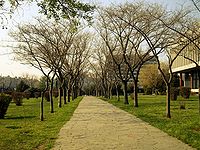
A picture of the Aristotle University's Campus.
The A.U.Th. Orchestra was established in February 1999 and since then it has participated in a lot of concerts held all over Greece. Since its establishment the interest of the students in it has rapidly increased. The orchestra gives regular concerts for the public of Thessaloniki during the national holidays (25 March, 26 October, etc.) and participates in international festivals and events .
Chorus
The official name of the Aristotle University Chorus is "J. Mandakas Chorus", named after its founder, John Mandakas, who created it in 1953. Nowadays the chorus plays a very important role in the musical and cultural life of the city of Thessaloniki and Greece generally. It also has a constant presence in musical events held all over the world, gaining not only national but also international recognition. For more than 50 years, the A.U.Th. Chorus has given the opportunity to more than 4000 students and other members of the academic community to cultivate their musical talent and to develop strong bonds of friendship and collaboration .
The chorus participates regularly in concerts held during national holidays, various events and festivals (Dimetria, Athens Festival etc.). It also organizes and participates in a lot of meetings of Greek and foreign choruses and orchestras. Finally it has published numerous CDs and DVDs and made a lot of recordings for the Greek national television and radio.
The chorus has contributed decisively in the development of choral music in Greece and in the familiarization of the Greek public with it through the presentation of hundreds of musical works. Furthermore it has presented many Greek compositions for the first time to the public, helping the Greek composers to achieve international recognition for their compositions.
Since 1964, the Aristotle University Chorus is a member of Europa Cantat, the European Federation of Choruses for young people. The rehearsals take place inside the Student club with the participation of the university Orchestra.
Student Week
The Student Week is a cultural event organized annually inside the university campus. It actually lasts for three or four weeks and is organized by more than 60 student groups, whose interests include dance, music, theater, cinema, sports, poetry, comics, etc. This event is open not only to all the members of the academic community of A.U.Th., but also to all the citizens of Thessaloniki.
Its main objective is to promote students' talents in art and culture and to encourage the free artistic expression of the students as individuals or as a group. It also aims at strengthening the human relations between the students and the personnel of the university. The interest of the students in the Student Week has been rapidly increasing since its establishment in 1999 .
Teloglion Foundation of Art
The Teloglion Foundation of Art was founded in 1972 with the donation of the entire fortune, along with a very rich art collection, of Nestor and Aliki Teloglou to the Aristotle University of Thessaloniki. This art collection is now exhibited in a separate building located in the northern side of the university campus. The Foundation is a non-profit organization supervised by the Aristotle University and directed by a board of Trustees composed mainly of university professors.
The art collection included mainly works of Greek artists during the 19th and 20th century and has now been enriched thanks to further donations made by famous persons and artists. At present, the collection includes works from various ancient civilizations, such as statuettes and pottery from the Hellenistic period, Corinthian and Roman pottery, Persian miniatures, Arabic and Chinese vases and dishes, etc. It also includes pieces from modern artists such as the monumental work of art "The World of Cyprus" by Diamandis.
The Foundation's mission is to support all art related studies and research and help the public familiarize itself with art and culture. This is achieved through the organization of numerous conferences, seminars and exhibitions of the museum's artworks.
Student Cultural Groups
There is a variety of student cultural groups that deal with Drama, Fine Arts, Music , Cinema, Chess, Debate, Comics etc. The cultural groups frequently organize events in which the work of the participants is presented to the public. These events can be theatrical plays, music concerts, debates, chess competitions, art exhibitions and many more. Every student can participate in any cultural group he/she likes and express his talent through art .
Participation in international organizations
The Aristotle University of Thessaloniki participates in the following International Organizations, Unions and University Networks:
- ΙΑU - International Association of Universities
- EUA - European Universities Association
- Coimbra Group
- TIME - Top Industrial Managers Europe
- EAIE - European Association for International Education
- ESMU - European Centre for Strategic Management of Universities
- CMU - Community of Mediterranean Universities
- EUPRIO - European Universities Information & Relations Office
- Utrecht Network
- European Language Council
- EAN - European Access Network
- World Association for the History of Veterinary Medicine
- TII - Technology Innovation Information
- ERA-MORE - European Network of Mobility Centres
- C.I.P.A. - International Committee on Monument Documentation
- A.D.E.E. - Association for Dental Education in Europe
- E.E.G.E.C.S. - Network on European Education in Geodetic Engineering, Cartography and Surveying
- CESAER - Conference of European Schools for advanced Engineering, Education and Research
- SEFI - Societe Europeene pour la Formation des Ingenieurs (European Society for Engineering Education)
- HumanitarianNet - Thematic Network on Humanitarian Development Studies
- E.C.P.R. - ESU European Consortium for Political Research- European Summer University
- ELIA - European League of Institutes of the Arts
Student Unions
- A.I.E.S.E.C. - Association Internationale des Etudiants en Sciences Economiques et Commerciales
- IAESTE - International Education for the Exchange of Students for Technical Experience
- B.E.S.T. - Board of European Students of Technology
Rankings
Aristotle University of Thessaloniki is among the most prestigious universities in Greece.
- Academic Ranking of World Universities - # 2 Greece, # 284 World
- THES - QS World University Rankings - # 2 Greece, # 231 World
- Leiden Ranking Top 100 European Universities - # 2 Greece, # 97 Europe
- Webometrics ~ Web popularity Ranking of World Universities - # 2 Greece, # 227 World
Honorary Doctorates
- Harry Markowitz - Nobel laureate (Economics).
- Clive Granger - Nobel laureate (Economics).
- Odysseas Elytis - Greek poet, Nobel laureate (Literature).
- Yiannis Ritsos - Greek poet
- Xenophon Zolotas - eminent Greek economist, former Prime Minister of Greece.
- Eric Hobsbawm - Historian
- Iakovos, Archbishop of America (1911 - 2005), Honorary Doctorate, School of Pastoral Theology.
- Santiago Calatrava award-winning Spanish architect and structural engineer.
- Patriarch Bartholomew I of Constantinople
- Robert J. Gorlin
- Manolis Glezos
- Richard L. Hunter, Regius Professor of Greek, University of Cambridge
Noted alumni
- Manolis Andronikos
Greek archaeologist and professor at the Aristotle University of Thessaloniki. Manolis Andronikos made one of the most important archaeological discoveries of the 20th century: he discovered the tomb of Philip II of Macedon at Vergina in the prefecture of Imathia, Greece. The tomb was unopened and contained many invaluable items, such as the Golden Larnax.
- Panagiotis Panagiotopoulos
Member of the Academy of Europe and professor at the Civil Engineering Department of the Aristotle University of Thessaloniki.
- Peter Fitzgerald
Member of the Republican Party in the United States and former Senator from Illinois (1999-2005). He completed his post-graduate studies as a Rotary Scholar at the Aristotle University of Thessaloniki.
- Phaedon Avouris
IBM Fellow and the manager for Nanometre Scale Science and Technology at the Thomas J. Watson Research Center in Yorktown Heights, New York. He has received many prizes, among which the APS Irving Langmuir Prize for Chemical Physics (2003), the AVS Medard W. Welch Award for Surface Science (1997), the Julius Springer Prize for Applied Physics (2008) and the Richard Feynman Prize (1999). He is a B.Sc. graduate of the Aristotle University of Thessaloniki.
- Manolis Triantaphyllidis
A major representative of the demotic movement in education in Greece.
- Gianna Angelopoulos-Daskalaki
Greek politician and business woman, named as one of the 50 most powerful women by Forbes magazine. She was the president of the Organizing Committee for the 2004 Summer Olympics in Athens, Greece. She studied Law at the Aristotle University of Thessaloniki.
- Christos Yannaras
An important Greek philosopher and writer.
- Emmanuel Kriaras
A Greek lexicographer and philologist.
- Evangelos Venizelos
Former Greek Minister for Culture and a member of the Greek Parliament for the Panhellenic Socialist Movement for the first electoral district of Thessaloniki. He is a Professor of Constitutional Law at the Law School of the Aristotle University of Thessaloniki.
- Vassilis Vassilikos
Famous writer and diplomat.
- Vassilios Nikopoulos
President of the Supreme Court.
- Vassilis Angelopoulos
Head of NASA's Themis project, 2010.
- Christos Sartzetakis
Greek jurist and elder statesman. He entered the Law 教职员工 of the Aristotle University of Thessaloniki in 1946, and received his degree in 1950, after which he practiced law in Thessaloniki. He was the unyielding prosecutor in the sensational case of the assassination of the left-wing member of parliament Gregoris Lambrakis, committed on 22 May 1963 in Thessaloniki by far-right extremists. On 9 March 1985 he was elected by the Greek Parliament as President of the Hellenic Republic for one 5-year term, succeeding Konstantinos Karamanlis.
- Vassilios Skouris
The 10th President of the European Court of Justice.
- Thanassis Papakonstantinou
A bust of Manolis Andronikos.
|
Peter Fitzgerald, a US Senator from Illinois (1999-2005).
|
Evangelos Venizelos, Former Greek Minister for Culture and member of the Greek Parliament.
|
Vassilios Skouris, the 10th President of the European Court of Justice.
|
更多
- University of Macedonia
- List of universities in Greece
- AHEPA University Hospital
- Teloglion Foundation of Art
- URENIO
参考文献
- ^ The Aristotle University home page
- ^ Faculties & Schools of the Aristotle University of Thessaloniki
- ^ History of the Aristotle University
- ^ History of the Faculty of Engineering
- ^ Message by the Rector
- ^ Administrative Bodies
- ^ The Student handbook
- ^ List of the departmental libraries
- ^ Libraries within the Aristotle University
- ^ The Photography Club's home page.
- ^ Information about the Student Union and the University Gym provided by the Department of Informatics.
- ^ Aristotle University Sports Centre
- ^ Aristotle University Sports Centre - Announcements
- ^ National Youth Foundation home page
- ^ Seismological Station Of The Aristotle University Of Thessaloniki
- ^ The University Farm
- ^ The University Forest Reserves
- ^ Camping Facilities in Poseidi
- ^ School of Modern Greek Language
- ^ Institute of Modern Greek Studies
- ^ Centre for Byzantine Research
- ^ Career Services Office
- ^ The Network Operations Centre
- ^ Aims of the Information and Technology Centre
- ^ Students employed by ICT
- ^ Social Policy Committee
- ^ Student Counseling and Guidance Service
- ^ Health Care Services
- ^ Student Unions
- ^ Orchestra
- ^ Choir
- ^ Student Week
- ^ Teloglion Foundation of Art
- ^ Faculty of Engineering - Music Club
- ^ Cultural Groups
- ^ "cum". Archived from the original on 2009-10-25. http://www.webcitation.org/5knIuYApV.
- ^ http://www.cwts.nl/ranking/top100_green_lst.html
- ^ University of Sydney News, 2 December 2005
External links
- Aristotle University of Thessaloniki official page in Greek and in English.
- Utrecht Network



